There are a number of sections within this document. Using the links below, or to the side, you can skip to specific sections.
If you need this page in another language, please head to: https://translate.google.co.uk. For more accessibility options and information, please visit: https://www.dbth.nhs.uk/a-z/accessibility/

Introduction
Our vision as a Trust is: “Healthier together – delivering exceptional care for all.”
This is further complemented by our priority statements, values and the DBTH Way.

This annual report provides a review of our patient experience data collected through the Friends and Family Test (FFT), National Surveys as well as themes from PALS enquiries, complaints, website communications and engagement events. It also features work undertaken and presented to our patient experience and involvement committee.
Activity
As an organisation, we have built upon the achievements and performance of the previous years, improving in some aspects of care, whilst upholding standards in others. We have also maintained a focus upon good financial performance, with an eye on capital developments and sustainability.
Our activity in 2023/24:
- We cared for 511,463 inpatients.
- We cared for 130,952 outpatients.
- We cared for 198,662 emergencies.
- We delivered 4,572 babies.
In comparison with 2022/23:
- We cared for 15,150 more inpatients.
- We cared for 29,041 more outpatients.
- We cared for 4,631 more emergencies.
- We delivered 66 fewer babies.

Experience
In this section:
- Complaints
- Inpatient survey
- Urgent and Emergency Care Results
- Children and young people’s patient experience survey
- Maternity 2023 survey results
- Patient opinion
- Friends and Family Test
Complaints
In the 2023/2024 financial year, 620 complaints were reported to the Trust. This was a 16.1% reduction from 2022/2023 financial year when the total complaints reported were 739.
The table below outlines the monthly reporting of complaints.

The table below outlines the key themes from complaints reported throughout the year.

The top theme in complaints was related to Patient Care, including hydration and nutrition with 136 complaints reported. The second most frequent theme was Diagnosis, including tests, delays, missed which had a total of 122 complaints reported.
The third most frequently reported complaint theme was Access to treatments, or drugs or equipment or appliances with 80 complaints received.

Complaints
Acknowledgement within three days: Local and national guidance requires that all complaints are acknowledged within 3 working days. The Trust sets itself a 95% compliance target in this area. The Trust has met this target throughout the year.
Complaints closed within agreed timescales: Meeting the proportion of complaints closed within the agreed timeframe has been challenging throughout the year.
A concerted effort was made during 2023/24 to recover the number of overdue complaints at the beginning of the financial year, which was 120. This reduced to 14 complaints overdue at the end of March 2024. During 2023/2024 work has been undertaken with the Divisions to improve complaints management processes and recruitment to key posts. This engagement work has supported the revision of the complaints policy to comply with the Parliamentary Health Service Ombudsman (PHSO) standards.
The closure of complaints within the agreed timeframe has remained below the set target throughout the year.
The table below provides the 2023/2024 ongoing position on the closure of complaints within the agreed timescales, which has remained below the Trust threshold of 85% throughout the 2023/2024 financial year. It should be acknowledged that, due to small numbers, caution should be taken when interpreting the data.
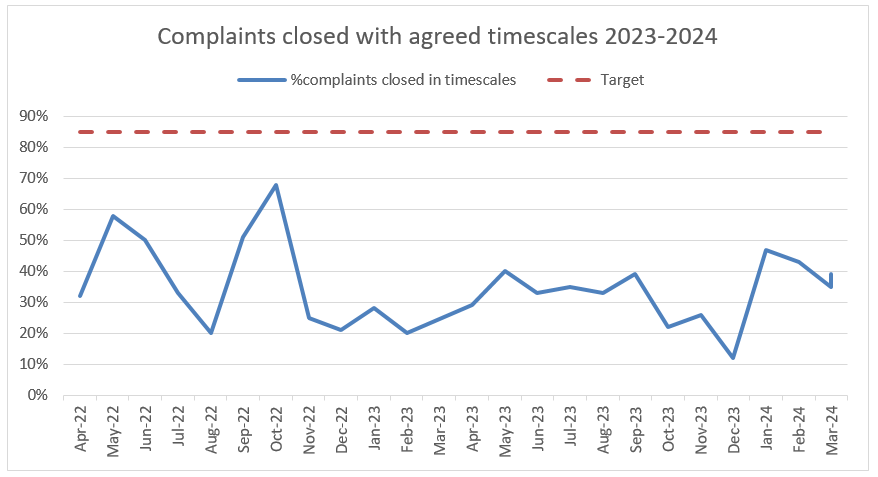
Parliamentary and Health Service Ombudsman (PHSO): The number of PHSO contacts reduced from the previous year, with an average of two requests for information made per month.

Inpatient Survey
The Trust participated in a number of Picker Surveys through the year.

Urgent and Emergency Care results
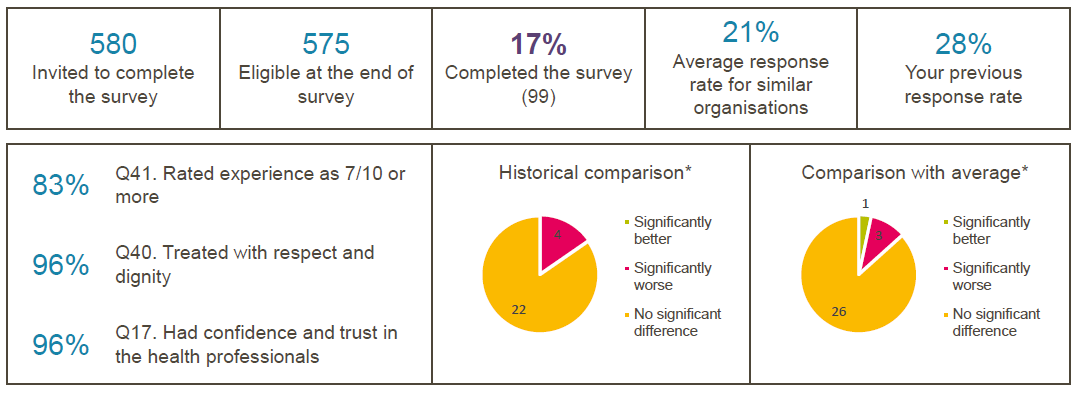
Children and Young People’s Patient Experience Survey
This survey is scheduled to be conducted in 2024.
Maternity Survey results

Action Plans were developed following all the CQC survey results and were monitored by the Patient Experience and Involvement Committee.
Patient opinion
There were 122 patient feedback submissions to patient opinion in 2023/2024. Each opinion is responded to and feedback provided to the relevant service for action/information.
Example of positive feedback:
“Every bed was full and staff were constantly back and forth. I genuinely expected a longer wait but the staff were amazing. If one person couldn’t answer a question or worry, it was less than 5 minutes before someone else did. I had to go to 2 separate imaging departments and was taken promptly by very kind and reassuring staff. I also had to wait for a consultant from a separate department and they arrived very quickly despite being based elsewhere in the hospital.
I was well informed and was very well cared for. It was clear that all staff showed care and compassion to all those around me. It is hard being in a hospital bay but simply hearing the staff and how kind and caring they were made the experience much better than I thought when the ambulance was initially called.”
Example of positive feedback:
“The NHS has been marvellous however from all the community care I have received from the nurses. I’ve had nurses out for ulcers and falls team out previously and they have been so kind and caring.”

Friends and Family Test
The Friends and Family Test (FFT) is a national survey designed to give the public an easy way to provide feedback on their experience.
The Friends and Family Test (FFT) is an important feedback tool that supports the fundamental principle that people who use NHS services should have the opportunity to provide feedback on their experience.
Listening to the views of patients and staff helps identify what is working well, what can be improved and how.
The FFT is made up a single mandatory default question followed by at least one open free-text question, so that people can tell us what they want us to know in their own words. The number of responses received for the friends and family test survey can be used as a sense of how effectively we have implemented the friends and family test survey as well as allowing us to review if are consistent with other settings in the proportion of responses received.
As part of a drive to improve response rates, in January 2024, the Trust changed the way in which we collect our FFT feedback.
The Trust were able to procure the services of Iwantgreatcare for a “pilot” period of 12 months, to support the data collection and analytics of the friends and family test survey. This would increase the options for patients to feedback to include text messages alongside paper forms and QR codes with the aim of improving the response rate. Iwantgreatcare also allows patients to complete the survey in other languages providing an inclusive way for feedback. Following the launch initially, there was aninitial reduction in the overall response rate.
Engagement with staff has identified that some ward staff had stopped giving patients the paper forms, assuming the survey was now electronic only. Regular ward visits are being undertaken to capture the majority of staff and ensure they are aware of the changes to the survey. The overall trend shows increasing responses month on month. It is anticipated the number of responses will continue to increase throughout the year.
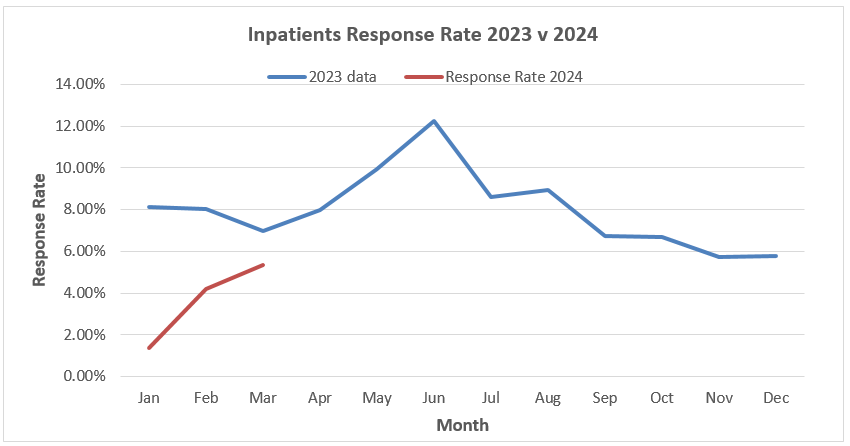
The overall the Trust Inpatient response rate has maintained below 10%. This is significantly below the average Inpatient response rates of other Trusts and there is work ongoing in the Trust to improve this by providing additional means to provide feedback to include text messages. Other work include:
- Nominating a member of staff to offer FFT forms to patients daily.
- Changes to the text messages to allow ease in completing the survey including sending patients a direct link to feedback on the department they were in so they are not having to look through the messages.
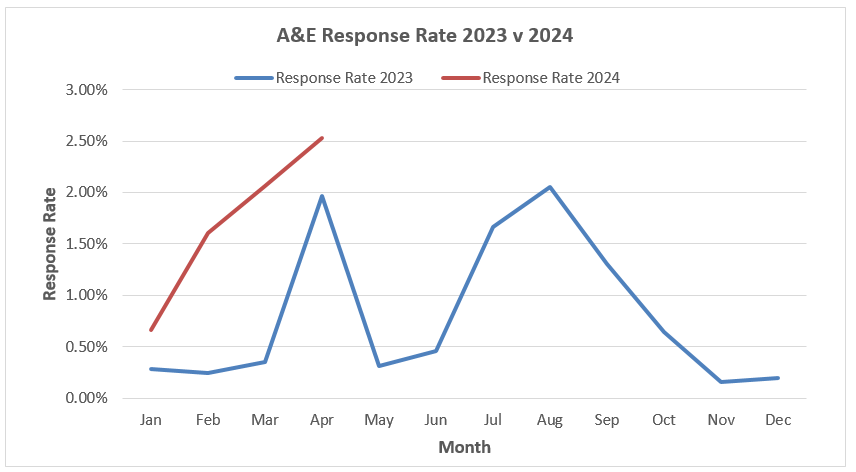
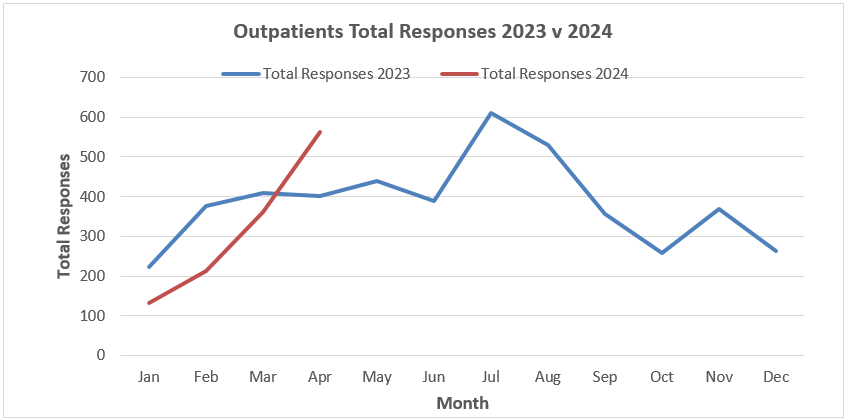
Please note the outpatient response rate in per count instead of proportion as the footfall for these areas was not being recorded for the period in order to calculate a proportion.
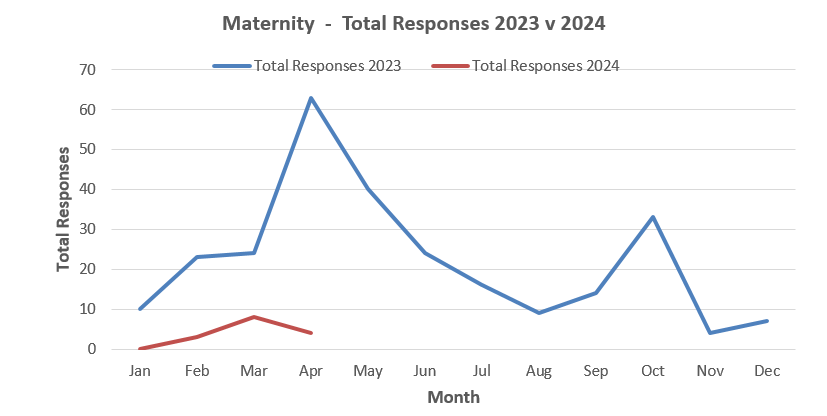
It should be noted, that following the transfer of the FFT survey to include SMS messages, there was a request from Maternity to exclude those patients who were undergoing safeguarding procedures. Data was not sent to Iwantgreatcare to commence SMS messages in Maternity until a process was agreed.
Accessible Information Standard
From 1 August 2016 onwards, all organisations that provide NHS care and/or publicly-funded adult social care are legally required to follow the Accessible Information Standards (AIS). AIS aims to set out a specific, consistent approach in identifying, recording, flagging, sharing and meeting the information and communication support needs of patients, service users, carers and parents with a disability, impairment or sensory loss.
The Accessible Information Standards working group was re-established during 2023 and meets regularly to work towards getting the Trust fully compliant with the standard. As part of their work they have established:
- The Trust’s main Patient Access systems have the ability to create flags on the system.
- The question regarding communication needs should be routinely asked as part of nursing assessment.
- The communications department has developed posters for patients aimed at ensuring they are aware that they can request information in other formats from the staff. There are also posters that have been developed for staff to increase the awareness of staff on the Accessible Information Standard and shared by the Trusts communications team.
- The Accessible Information Standard Group is also involving local community groups including the deaf community and partially sighted society.
- The Trust has co-developed a draft Accessible Information and Community Policy with community groups which will replace the Trusts Translation Policy.
- As part of the feedback received, the Trust has procured a variety of translation services in order to meet patient communication needs, including video relay messaging, face to face British Sign Language (BSL) interpreting service, face to face language interpreters, telephone interpreters, translation of documents into other languages as well as other formats such as Braille.
- The Trust has begun a review of its letter templates based on patient feedback.
- In December 2022 NHS England published guidance on the national reasonable adjustments flag and work is ongoing in the Trust to enable compliance with the requirements.
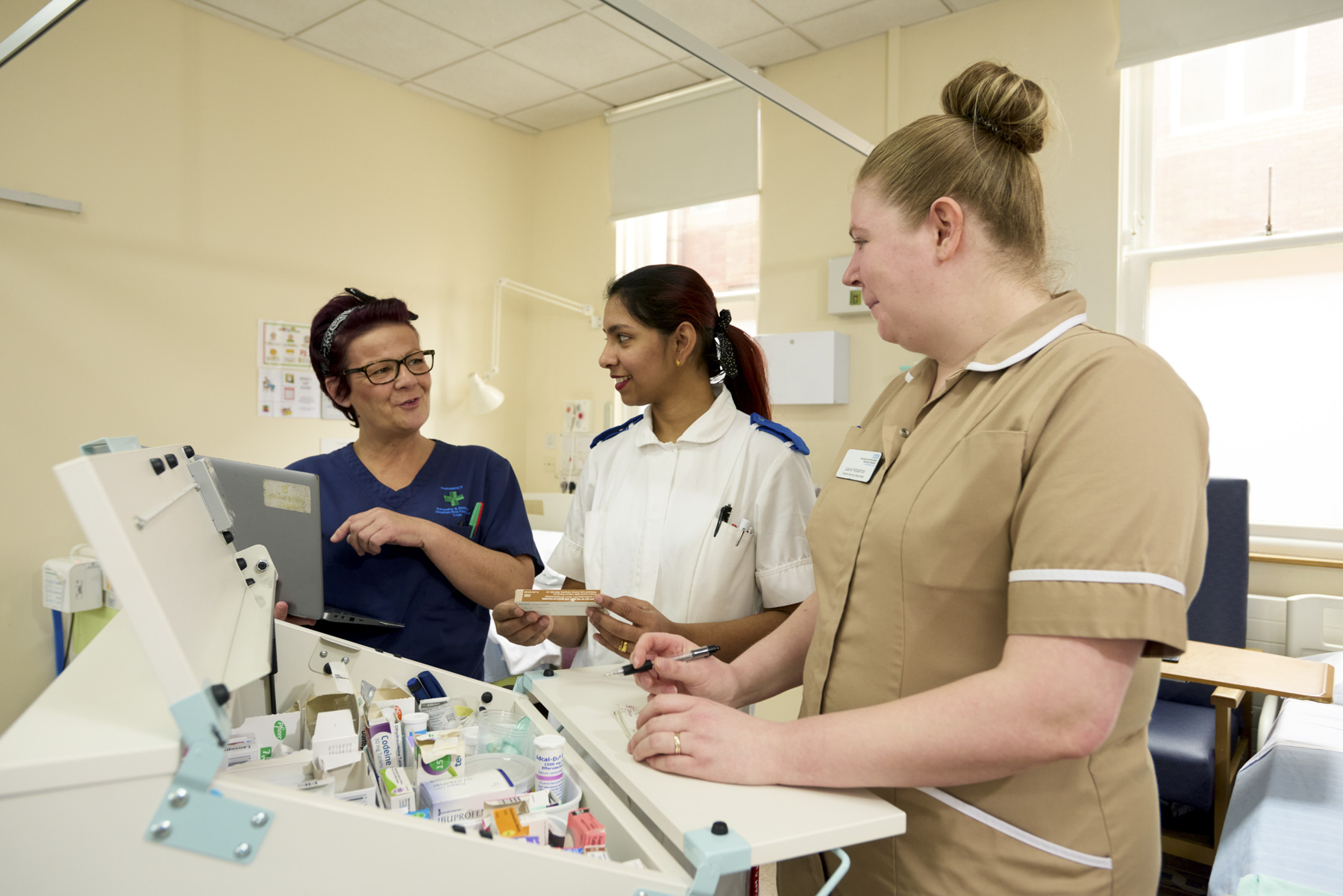
Engagement and involvement
The Trust has participated in twelve engagement events throughout 2023/24
| Public/Community Engagement Piece of Work (Completed in the Last Year) | Groups Engaged With for Their Views | Insights Gained | Actions Taken |
|---|---|---|---|
| Feedback on Trust Leadership framework. | Community groups engagement via Health-watch | There was great praise for the first page of the document and the ‘we care values’; there was also some feedback regarding some of the wording that could have been improved. | Feedback shared with lead and Leadership framework has since been launched. |
| Engagement event attended the People focused Group | Community voluntary sector Group. Feedback from patients who community warden visited. | One stated they were admitted late and they were not given food the next day as she was not there when she ordered. One lady said ‘you are doing a good job’. | Sodexo have actions in place to ensure patients who are admitted late are accounted for in the meals. |
| Engagement event – Doncaster race course. | Community event | As part of being visible in the community, the Trust attended local community events and had a stand at Doncaster racecourse during their family day. We obtained feedback from patients regarding what matters to them post-hospital stay. Feedback regarding Ambulatory Care Unit: staff were friendly, it was clean, no long wait times, and everything was well explained. Feedback related to the Maternity service: staff were friendly, approachable, and gave good advice. Fracture Clinic: long waiting times. Cataract eye surgery: very friendly. | This feedback was given to the responsible teams. |
| Engagement event – Partially sighted society | Local Voluntary Sector group. | The partially sighted society fed back on our communications and how we can improve patient access to our letters. | Partially Sighted Society invited to Accessible Information Standards working group. Accessible information standard policy has been drafted with feedback from the group. |
| Review of eliminating mixed sex accommodation policy. | Feedback from community groups through health watch. Feedback also obtained from staff LGBT Forum. | Feedback on policy language and terms. | Revised policy now been ratified. |
| Development of Patient Safety Incident response framework patient leaflet. | Feedback obtained from community groups through health watch, also received from the deaf community. | Feedback asked if the language could be changed and there was also a request for BSL video from the deaf community. | The leaflet language was changed to make it easier to understand. A BSL video was also developed for the leaflet and published on the patient safety page. |
| Feedback on the Nursing and Allied Health Professionals Strategy. | Obtained feedback from community groups on the Nursing and Allied Health Professionals Strategy. | Feedback on the presentation and understandability of the document for members of the public. | Amendments made to the final document based on the feedback. |
| Focus Group – Deaf community | Focus group feedback on the trust. | Feedback regarding letters only having a telephone number for contact, request for video relay messaging, request for review of interpreting service. A request also made for calling screens in outpatients. There was also feedback regarding the Trust’s Audiology Department. | Changes made to the information at the back of our trust letters to also include an email address contact. The trust now has a video relay messaging service available. A request for patient calling systems has been added to the specification of our patient kiosks when they are reviewed. |
| Community Event – Bassetlaw multicultural event | Community engagement event | Feedback from attendees was positive, especially around the use of simple language to make it easier for patients to understand. | Information shared with teams. |
| Community Veterans focus group | Community engagement event | They provided feedback regarding the importance of identifying if patients are Veterans, giving examples such as the Royal British Legion funding hearing aids for Veterans. One gave their view stating ‘don’t ask don’t care’. They explained the impact of Post-Traumatic Stress Disorder and that when staff do not understand their condition, they can easily trigger them. They felt more comfortable with services run by ex-Veterans as they understood them. | The Trust has reaccredited as a Veterans aware hospital. The Trust has also changed its documentation for nursing to have a mandatory question asking if a patient is currently serving or has served in the British Armed Forces and another asking if a patient is a close family member of somebody who is serving or has served in the British Armed Forces. |
| Community event – Senior citizens fair | Community engagement event | The majority of the feedback was positive with only one person feeding back about staff attitude which can be improved. | This was shared with Divisional Nurses in the Patient Experience and Involvement Committee. |
| Community engagement event Parkinson’s up | Community engagement event | There was some feedback regarding Audiology waiting times. There was also feedback regarding essential medications for Parkinson’s and the timeliness of its administration. | There is an Audiology Quality improvement project which is currently ongoing. The Divisional Nurse for Medicine is leading a working group on improving the timely administration of essential medicine. |

Volunteers
Volunteers are integral in enhancing the quality of care to patients at Doncaster & Bassetlaw Teaching Hospitals NHS Foundation Trust (DBTHFT).
There are a wide range of roles undertaken by our dedicated volunteers; escorting patients around the hospital, ward volunteers, clinic volunteers, library volunteers and A&E Volunteers. We are in the process of developing new roles for the Dietetics Department and Pharmacy.
On average, there are 170 volunteers. This was an increase from the previous year when the Trust had an average of 157 volunteers.
During 2023/2024 the Trust recruited 19 volunteers. To support our recruitment process we are engaging with communications to utilise the Trusts social media platforms and we advertise our positions on the BCVS (Bassetlaw Community and Voluntary Service) website.
The Trust also participated in the South Yorkshire Volunteering for Health Bid, as well as the Nottinghamshire Volunteering for Health Bid. The South Yorkshire bid aims to create meaningful volunteering experiences for people in under-represented groups, strengthening Place and system level cross sector volunteering opportunities.
The Nottinghamshire Volunteering for Health Bid focused on a BCVS recruiting volunteers for Bassetlaw site hospital. We are currently awaiting the outcome for both bids.
Work also began on the development of a Trust database to manage volunteers and record hours as well as demographic data. This will support a more strategic recruitment as we will it will focus our recruitment of volunteers in those groups that are underrepresented.
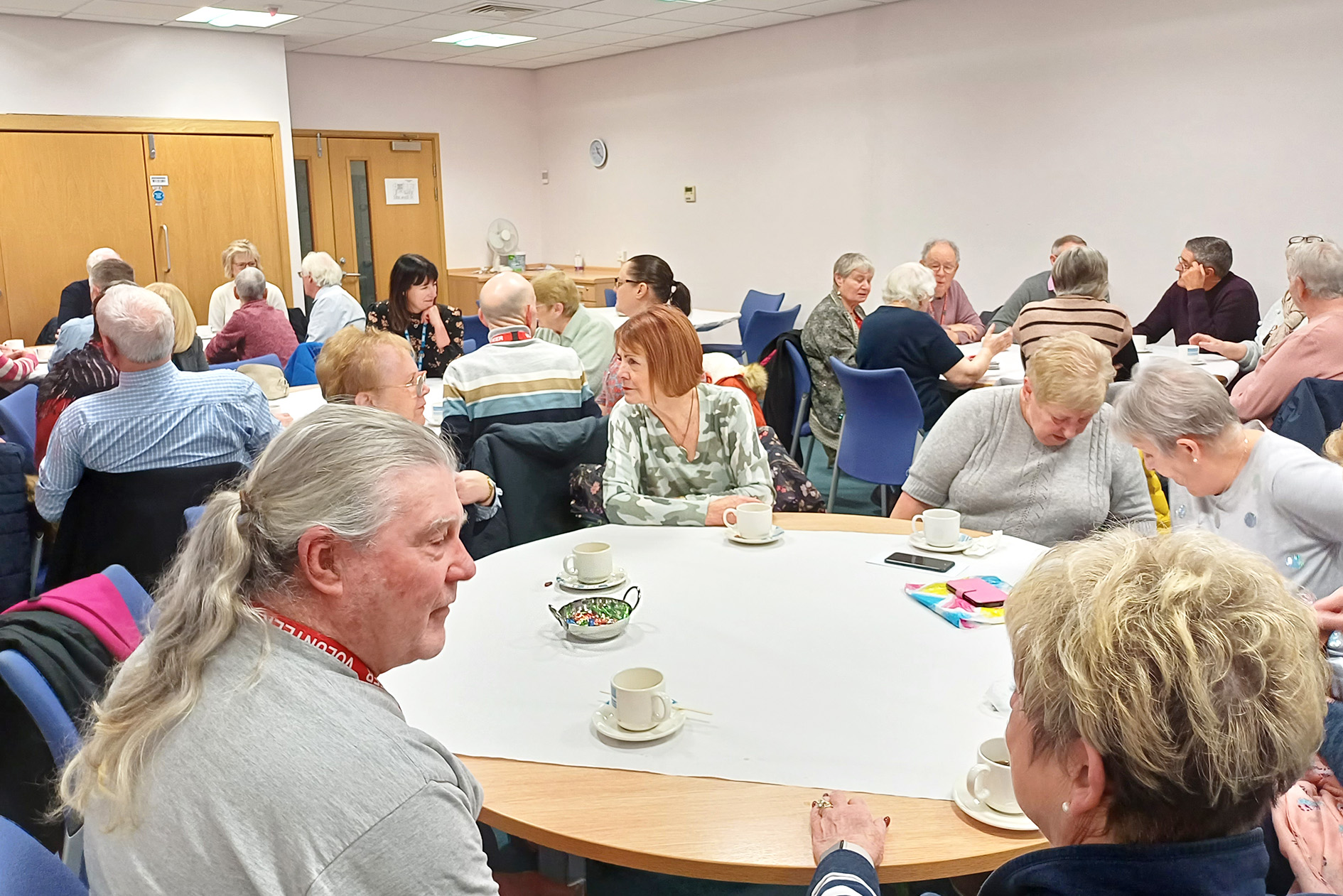
Innovation
Following a successful NHS Charities Bid the Trust were able to commission the People Focused Group as the Trust’s engagement partners over a twelve-month period. As part of this project, peer supporters will be spending time in the following areas:
- The Emergency Department at DRI
- the Emergency Department at Bassetlaw Hospital
- St Leger Ward DRI St Leger Ward 9 (Orthopaedics)
- Mallard DRI Mallard Ward (Gresley Unit) – Dementia
- SEND Therapies DRI
- Audiology Sandringham Road Centre
- Montagu Hospital Audiology
- Bassetlaw Hospital Audiology
- Ward 26 DRI Ward 26 (Surgical Unit)
- Elective Orthopaedic Mexborough Elective Orthopaedic Centre
- Mexborough Community Diagnostic Centre
Peer supporters will get to know patients and the Trust services providing a unique community led view of each area. They will also be the link to ensuring the patients’ voice is central to receiving excellent care across the Trust.
The Peers have also participated in the Trust Care Accreditation Audit undertaking care questions for the Audit. This provided patient opinion on services as well as getting unique insights on feedback patients gave to the peers on their experiences of care. The People focused group are also assisting the Trust in recruiting to its citizens panel through its wide network of patient groups. The aims is that by the time the twelve month pilot has ended the Trust will have a functional Citizens’ Panel and Readers’ Panel.
The project and peer engagement will be evaluated following the 12-month period.

The next 12-month and beyond
Our plans for the next 12-months are as a follows:
- Provide a wide variety of ways for patients to feedback to us.
- Hold community engagement events and work with Healthwatch and voluntary sector organisations in the community to gain insight and feedback from the community including those groups who are seldom heard or affected by health inequalities.
- Embed and Audit Carers Charter/Contract.
- Embed and Audit the John’s campaign principles.
- Review our complaint handling process for opportunities to provide swifter resolution for people when they raise concerns.
- Review patient experience reporting and escalation procedures to ensure Chief Nurse and Board have oversight of patient experience.
- Establish a patient forum and engagement panel.
- Achieve compliance with Accessible Information Standard.
- As part of the Patient Safety Incident Response Framework Introduce of Family Liaison Officers
- Introduce “relative ward rounds” across inpatient areas.
- Embed, patient involvement and co-design into our organisations Policies, Procedures and Governance. Integrating the patient, family and carer voice within our everyday business.
- (Improve how we) Celebrate success stories when we’ve engaged with patients/families to change services and feedback on changes is positive. (‘You said we did’) and demonstrate and share learning where things haven’t gone so well.

Proposed Developments for the Volunteer Services for 2024/2025
- Develop a Volunteer Strategy.
- Work more closely with other organisations and educational bodies to develop volunteer roles aligning evolving healthcare roles.
- Increase the current level of volunteer activity reflecting the diverse local population.
- Maintain and continue to raise the profile of the value of voluntary services within the Trust and the community.

Content out of date? Information wrong or not clear enough? Report this page.

